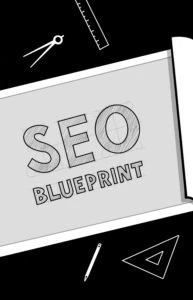 Do you remember the food pyramid? Nowadays, it’s no longer taught in school as they’ve switched to a model meant to be easier for kids to visualize, consisting of a plate divided into portions. Nonetheless, most of us raised with the food pyramid understand how the structure of a pyramid can be applied to concepts: It starts with a strong base, your staples, and other things build on top of that. Without the right foundation blocks, the rest of the pyramid doesn’t hold up correctly, but every block is needed in order to complete the picture and create something functional. This concept can also be applied to search engine optimization.
Do you remember the food pyramid? Nowadays, it’s no longer taught in school as they’ve switched to a model meant to be easier for kids to visualize, consisting of a plate divided into portions. Nonetheless, most of us raised with the food pyramid understand how the structure of a pyramid can be applied to concepts: It starts with a strong base, your staples, and other things build on top of that. Without the right foundation blocks, the rest of the pyramid doesn’t hold up correctly, but every block is needed in order to complete the picture and create something functional. This concept can also be applied to search engine optimization.
There are five levels to the SEO pyramid blueprint:
- Technical SEO
One of the biggest mistakes a business can make in search engine optimization is not hiring a technical SEO professional. There’s a reason this is the first building block of the SEO pyramid, and yet it’s something that sometimes gets overlooked or taken for granted. Technical SEO is the all the nitty-gritty stuff behind the scenes that makes your website function properly and interact with Google’s algorithm so it can be indexed and displayed on search results pages. If you have technical errors preventing Google’s spiders from crawling your website properly, it won’t be able to index your pages properly, which could result in zero search results for your website.
Technical SEO is also important in terms of user experience and safety. For example, does your site load quickly? Is it safe for users to visit without worrying about attacks to their device or the way their information is being used? Do your links function properly? Does the webpage display the way it’s meant to? These issues may seem basic, but errors occur with surprising frequency, and a technical SEO expert understands how to fix them. Additionally, they can also employ strategies that will help boost your SEO, such as making your site mobile-friendly.
Here’s a simple technical SEO checklist to ensure you have a solid first block in your SEO pyramid. Your technical SEO expert should be able to complete all of these:
- Remove “crawl errors”—errors that keep Google’s spiders from crawling your website properly. You can use a tool to crawl your own website to find these errors.
- Improve your internal structure. Known as “crawl depth,” this measures the number of links it takes to get to each page on your website. Each page should only have a crawl depth of 1-3 links.
- Remove structure data errors—errors in the information Google uses to determine what kind of content is on a page, such as differentiating a recipe from a contact form page.
- Narrow your URLs down to one variant and redirect all other variants to that version. This means if you’re using https://examplewebsite.com, if someone types in www.examplewebsite.com, it should redirect to the former version.
- Ensure you’re not duplicating content anywhere on your website and that you only have one page optimized for each keyword to avoid confusing the algorithm, competing with your own website, or getting penalized for duplicate content.
- Content
Without content, you don’t have much of a website, which is why it’s the second building block. You need technical SEO to ensure users can reach your content, but equally important is having something valuable for them to see. Content is probably the most powerful tool you have to create awesome results in search engine optimization. Google wants to give users content that satisfies their needs and keeps them engaged, so it will always prioritize the best content.
There are hundreds of content strategies out there and plenty of ways you can use content to boost your SEO. But the point of search engine optimization is to draw users to your website by ranking well on search results pages, which means that your priority should be to outrank your competitors. Whoever is in the top spot for your search terms is the website you need to beat to get your potential client or customer’s attention.
If there’s anything you focus on with your content, make it better than the content your competitors are publishing. That means if they have a useful article that’s 3,000 words long, you can write an even better and more useful article that’s 5,000 words long, and pack it full of the best information and resources you can. Reliably beating your competitors at every aspect of their SEO will quickly get you to the top of search results pages.
- Digital PR
Popularity, relevancy, and integrity are three key ingredients in the way Google determines how it ranks websites on search results pages. How does it determine those things? Well, the algorithm is complex, but one of the major factors is through links. Google uses links to understand websites’ relationships to one another. Link-building is the practice of gaining inbound links to boost your popularity and relevancy in Google’s eyes. Similar to digital PR, it requires you to build relationships.
You want people to be talking about your website and linking to it in order to increase your popularity. The integrity or quality of those links also makes a big difference. It doesn’t do you much good to gain links from sites that have no relation to your own, and it can even do you harm to gain links from low-quality or spammy sites. Link-building will happen naturally over time as you produce great content that people want to talk about and link to, but there are things you can do to gain links more quickly. Some of the best ways to build links are through guest blogging, publishing articles in online publications, using social media, and connecting with reputable people wherever you can.
- Local SEO
The world of the internet can seem large, but it’s important not to neglect your local SEO. It’s easier to complete on a local level rather than a global one, and there are a lot of benefits to specially targeting your local audience. I always advise to start with your Google My Business (GMB) listing, which places your business on Google Maps, allows you to post basic information and pictures, and gives users a place to leave reviews.
If you haven’t set up a GMB listing, you’ll likely need to claim it, as Google will often auto-populate one for you. Your SEO expert can help you through the process of claiming the listing, and from there you’ll be able to optimize it.
Here’s a simple optimization checklist:
- Complete your profile and ensure all information is filled in, especially your name, address, and phone number.
- Use a professional photographer to add photos of your business.
- Add local schema markup to your website, which allows Google to auto-populate information from your website onto your GMB listing.
- Ask past and current clients for positive reviews.
- Reputation
The final block on the SEO pyramid is your reputation. The previous things listed will affect your reputation, so it’s important to get those right first. Your technical SEO will partially inform Google whether your site is trustworthy to send its users to. It’s important not to have any SEO penalties and to keep your site secure for that reason. The trustworthiness of your content is another factor—you don’t want to provide users with information that could be wrong or potentially harmful to them. The links that you build with your digital PR will make a big difference in how Google perceives your reputation. And finally, the reviews you receive from clients or customers are a major factor in your reputation. The last building block cannot stand without the ones beneath it.
By consistently focusing on these five key SEO ingredients in order, you’ll create a strong strategy for great SEO results. Remember, it’s an ongoing continual process to get to (and stay at) the first page of a Google search.




